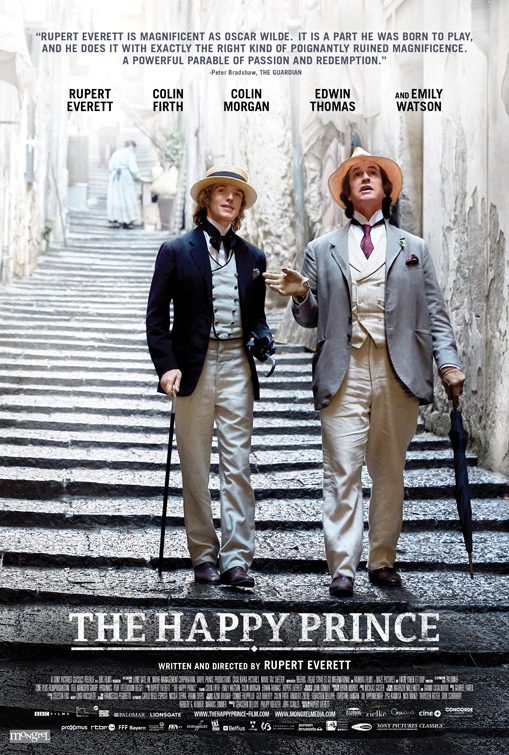The directorial debut from celebrated actor Rupert Everett (Shakespeare in Love, My Best Friend’s Wedding), The Happy Prince is at once a spirited tribute to legendary author and playwright Oscar Wilde and an exacting commentary on 19th-century British mores.
It is 1895, and Wilde (Everett, A Royal Night Out) has been imprisoned for two years for gross indecency after his affair with Lord Alfred “Bosie” Douglas (Colin Morgan, Testament of Youth). Upon his release, he is greeted by companions Robbie Ross (Edwin Thomas) and Reggie Turner (Colin Firth, The King’s Speech; A Single Man) and quickly moves to France to spend his final years in exile. Yet, much to the dismay of his friends, Wilde reunites with Bosie, motivating his wife, Constance (Emily Watson, Testament of Youth; The Book Thief; Belle), to cut off Wilde’s allowance. With a lack of funds, and due to the trauma he suffered in prison, the author’s health and well-being deteriorate. Still, it is through his incomparable talent for storytelling that Wilde finds the strength to continue bringing levity and humour to those around him.
Also starring Tom Wilkinson (Selma, Belle), The Happy Prince is as flamboyant as its subject, using slow-motion tableaus to highlight Wilde’s carefree jaunts and flashbacks to reflect on his triumphs and tragedies. Everett is defiantly theatrical in both his performance and his directorial choices. Everett also uses the film as a plea for tolerance, showcasing the degradation Wilde endured throughout his lifetime because of his homosexuality. It is a moving portrait of one of our most revered storytellers, directed by an artist at the top of his game.
“Everett looks at home in this role and breathes new life into Wilde. The Happy Prince proves that Rupert Everett was born to tell the tumultuous story of a kindred spirit. Oscar Wilde would be proud.” (Tiffany Tchobanian, Film Threat)
“This film is a deeply felt, tremendously acted tribute to courage.” (Peter Bradshaw, The Guardian)
“Florid but warmhearted—much like the man at its center—The Happy Prince is a haunting portrait of the aftermath of betrayal; of how the master of comedy became a tragedy.” (Moira Macdonald, The Seattle Times)
